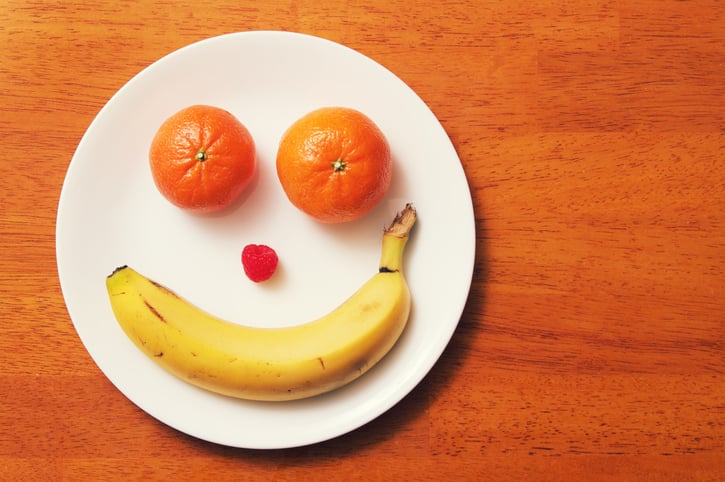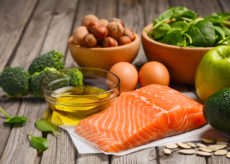Foods and Moods: Can What and Why You Eat Make You Happier?

When you think of foods that make you happy, you might immediately start fantasizing about treats, like ice cream, donuts, or cake. Or, maybe you yearn for comfort foods, like mac and cheese, mashed potatoes, and pizza. Or, perhaps there are some nostalgic foods, like Mom or Gramma’s chicken soup, homemade bread, or lasagna, come calling your name—especially if you’re dieting. But is there a correlation between foods and moods?
There’s debate on how much “comfort” those types of foods actually provide with recent research indicating less than you’d think. In fact, one study found that comfort foods offer no more comfort than non-comfort foods, neutral foods, or even no food. Surprising, right?
What’s more, while those foods may taste good in the moment, within minutes, you might begin to feel even worse: bloated, tired, or just blah mixed with a good dose of shame and guilt. In other words, not happy at all! ☹
Yet, according to research, what we consume as well as when we eat it can positively affect our mood. And along those lines, some foods have been shown to help us become happier as well as healthier.

The Shape of Water
One recent study published in the journal Appetite revealed that the more water they drank, the better people felt. Specifically, as water consumption increased, scores for negative feelings like tension, depression, and confusion went down. In another study, doubling their water intake (from around 5 cups a day to 10) resulted in folks enjoying improved mood, energy, and satisfaction. And when folks who drank lots of water decreased the amount, it had the opposite effect: the low water intake led to worse mood along with increased headaches, tiredness, and even confusion.
Here’s yet one more happy reason to drink more water: according to a study from the University of Connecticut’s Human Performance laboratory, even a dip of 1.5% in normal fluid—mild dehydration—can lower energy levels and mood and lead to fatigue, headaches, more difficulty performing tasks, increased anxiety, and lowered memory.
So, if you find yourself feeling down, drink up. According to The Institute of Medicine guidelines, 20% of our fluids come from foods, so the recommendation of 8 to 12 cups per day can be enough to reach the 2.7 liters of fluid recommended for women and 3.7 liters recommended for men; however, remember that exercising and heat also increase those requirements.
Ahhh… now that’s better!

The Positive Power of Proteins
You may have heard dopamine and serotonin called “the happy brain chemicals.” These are nerve chemicals (neurotransmitters) that regulate numerous bodily processes, including mood. They’re made up of amino acids, which are the building blocks of proteins.
It turns out that ensuring we have adequate levels of serotonin, which is made from the amino acid tryptophan, helps improve mood while reducing cravings and even aggression. Dopamine, on the other hand, is made from the amino acids tyrosine and phenylalanine, and it’s known for helping improve mood as it increases energy and alertness along with problem-solving skills.
And where are they found? You guessed it: protein-rich foods! For example, eggs, almonds, and legumes are good sources of the amino acids that contribute to dopamine production. And you’ll find tryptophan in eggs, milk, yogurt, meat, and bananas. What’s more, nutrients believed to increase serotonin levels include fish, carbohydrate-rich foods (see below), and foods high in vitamin D and B vitamins like folate.

Carbohydrates Count
Before you start thinking it’s all about the protein, let’s take a look at carbs, too. Carbs also play an important role in serotonin production. The hormone insulin (which is stimulated when blood levels of carbs/sugar are elevated), for example, allows the tryptophan to pass through the blood-brain barrier to convert to serotonin. That doesn’t mean you want to load up on sugar! Just the opposite, in fact. Lower GI (glycemic index) carbs are known to better support mental wellness as they convert to sugar more slowly without a huge spike and crash.
Low GI foods like vegetables, fruits, sweet potatoes, legumes, and oatmeal (for just a small sampling) provide the brain with a steadier release of fuel for a longer-lasting, more beneficial effect on the brain and mental functioning.
So, as you’re choosing which carbs to eat, reach for whole-food sources of fruits and vegetables. One study showed that folks who ate two to four servings enjoyed a 41% lower chance of “frequent mental distress.” And in this case, more was even better as those who enjoyed five servings per day experienced a 52% lower incidence.

Facing Fats
Did you know your brain has the highest fat content of all your organs? So, it’s likely not surprising that fat has a pretty important role in brain functioning. Essential fatty acids, including omega-3s and omega-6s, are necessary for the brain’s structure. What matters most appears to be the ratio between the two. It’s really easy to overconsume omega-6 fatty acids, which are abundant in plant-based foods (like nuts and seeds), and because they’re so predominant in processed foods (in the forms of refined vegetable oils, like soybean, corn, and sunflower), most people consume a LOT of them. Omega-3 fatty acids, particularly EPA and DHA, are more difficult to find, though rich sources include fatty fish, like salmon and sardines (hence the reason experts recommend eating fish two to three times per week). There are also plant sources of omega-3s, like flaxseeds and oil, hemp, and walnuts, though they are packaged in a different form that don’t have the same beneficial effects as EPA and DHA found in marine sources.
Feeling Hangry?
Of course, what we eat is important, but so is how. There’s a reason that “hangry” is a real word and a real experience for many of us. (As we say in my family when anyone gets grumpy, “It’s time to feed the bear.”) Often, when we start to feel hungry, we’re also experiencing a drop in blood glucose levels and a change in regulatory hormones, which can quickly lead to feelings of irritability, frustration, and fatigue or “hanger.” In short, we become grumpy and short-tempered. Plus, we’re more likely to put a negative spin on our experiences.
It’s common for folks to reach for a quick-fix when feeling hangry—chips, candy bars, or whatever’s most convenient. However, these types of food can leave you feeling even worse. To best defeat hanger, instead reach for nutrient-rich, whole foods like those discussed above.
On the other side of the coin, when we overeat, our emotions can be taken over with feelings of guilt, sadness, emotional distress, and depression. Surprisingly, the negative effects of a heavy meal may last even longer than you’d think. One study found that those who ate more calories, fat, and sodium in just one meal reported struggling with a more negative mood up to two days later!
We’ve mentioned mindfulness numerous times in this blog, and for good reason. Being mindful of your mood can also help you be more mindful of how you eat. Check your mood before taking a bite as both being in a positive mood and being in a negative mood can make you eat more.
Your emotions can also change how foods taste. Researchers looked at hockey game attendees and found that when their team is winning, which puts people in a better mood, sweet flavors tasted sweeter while sour flavors were less intense. For the fans of the losing team, and thus, those in a worse mood, the results were the opposite—sour flavors were heightened and sweet tastes diminished.
The Relationship of Foods and Moods
We humans are seriously complex, highly individualized creatures, so while these are great guidelines to help us eat not only for our health but also for our happiness, your experience may not be the same. And the research on food and mood is still in its infancy with new discoveries happening every day. This again reminds us to be mindful of how we eat and how food affects the way we feel—our minds and our bodies. Then we can focus on eating more of the foods that help us feel healthy and happy and less of those that don’t. Yet, when it comes to health and happiness, we can all agree that drinking more water, eating more whole foods—including fruits, vegetables, and quality proteins—is a pretty great start.







